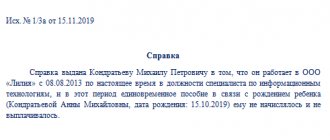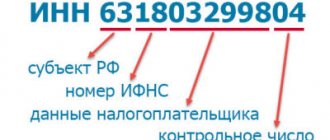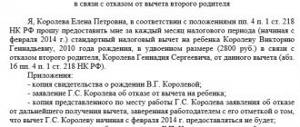Author of the article: Roman Gavrilov Last modified: January 2021 6084
Documents for registration of a will are necessary to give legal status to the written expression of will. The list of documents depends on the list of property and heirs to whom it will be transferred in the order of full legal succession. This means that the estate will pass to the legal successors in its entirety, including the debts of the testator. They can be confirmed by separate documents - loan agreements, receipts and other documents containing the contractual obligations of the parties.
How to make a will
A testamentary disposition is drawn up personally by the testator. There is no strict form of the document; the main thing is that it reflects all the necessary information. It can be typed on a computer, printed and signed by hand. Only in the case of a closed will (the contents of which are not disclosed to anyone), it must be written by hand.
According to the law, registration of a will with a notary is possible anywhere, in any city and notary office in the Russian Federation, regardless of the place of residence of the testator. The drawn up order must indicate:
- Full name of the testator, his passport details, place of residence;
- date and place of its writing (without them the document will be void);
- Full name of the heirs, indicating the share of specific property that goes to each of them (without indicating the shares, it is divided equally).
What documents are needed?
No documents are required at the notary's office to register a will, other than the applicant's identification card. The notary does not verify the actual ownership of the bequeathed property to the testator. The order may indicate not only the property available at the time of certification of the document, but also that which will be acquired in the future.
The testator must keep in mind: his heirs will need title documents for the property when registering their inheritance rights. They will have to confirm the testator's ownership of the property he left as an inheritance.
It must be remembered that if any additional conditions are specified in the will, the heir will have to confirm them. For example, the testator indicated that he was leaving an apartment to his daughter as an inheritance. In addition to the passport, the heiress will be forced to present documents on kinship (birth certificate, change of surname) confirming that she is the daughter of the testator.
How to register if the testator is a foreigner?
When registering an inheritance, the responsibility for determining the status of a person, namely whether the testator is a resident or non-resident of the country, falls on the notary.
If a foreigner wishes to draw up a will in the Russian Federation, he must present the following documents to the notary: the foreigner’s national passport or any document replacing it, as well as a residence permit in the Russian Federation, a service or diplomatic passport.
In addition, it is necessary to present documents confirming the fact of ownership of specific property. Otherwise, the procedure for drawing up a will is the same as in the case of a document being drawn up by a citizen of the country.
Dear readers! To solve your problem right now, get a free consultation
— contact the on-duty lawyer in the online chat on the right or call:
+7
— Moscow and region.
+7
— St. Petersburg and region.
8
- Other regions of the Russian Federation
You will not need to waste your time and nerves
- an experienced lawyer will take care of solving all your problems!
Certification of a will by a notary
The testator must present the document to the notary's office in person; representation is not allowed. Property documents are not needed to register a will with a notary; you only need a passport. The certification procedure is described below.
- The notary checks the applicant's passport and the compliance of his data with the information specified in the will.
- During the conversation, he makes sure that the testator acts of his own free will, without coercion, and gives an account of his actions.
- The testator can invite 2 witnesses who are not the heirs and their close relatives.
- The applicant and witnesses sign on the document that they have received all explanations according to the law from the notary.
- The applicant receives one copy, the other is kept in the notary's office.
A testamentary disposition may contain instructions both in relation to the entire property (“I bequeath all the property belonging to me to I.N.”) and in relation to individual things. For example, the testator bequeathed an apartment to his wife. Then everything else (car, garage, land plot, country house) is subject to inheritance according to the law (priority).
Additional papers for writing a will
Drawing up a will solves the problem of distributing property among existing heirs. In this case, the testator decides during his lifetime who will receive what property after death. All decisions made are recorded on paper.
For a house, apartment
When drawing up a will, a few papers are required from the testator.
To write a will for a house or apartment, you need to provide the following basic documents:
- passport for identification;
- documents confirming ownership of the apartment.
A certificate of legal capacity is one of the additional papers. After all, it is mandatory for citizens over 70 years of age.
Expert opinion
Irina Vasilyeva
Civil law expert
If the testator is physically unable to contact a notary, is undergoing treatment in a medical institution or is in a nursing home, the administrative document may be signed by the chief physician of the medical institution.
For a plot of land
The rules for drawing up a will for a land plot are prescribed in the Civil Code of the Russian Federation. The articles of this code take into account all the nuances of legal inheritance of property. The testator needs to know that he can bequeath a plot of land and other property to any person. In this case, the shares will remain with the legal heirs.
To draw up a will for a land plot, you must provide the following documents:
- identification;
- documents on ownership of the site;
- papers on the ground, as well as a floor plan of the house;
- certificate of the market value of the property.
Additionally, the notary may require technical papers for buildings located on the territory of the land plot. In any case, you need to ask a notary about the need to present them.
For securities, deposits
To draw up a will for a deposit or securities, you must visit a notary and a banking institution.
All that is required for this is to confirm your identity and the fact that you have a deposit with a specific banking organization. The will must include the following information: place and date of drawing up the document, information about the owner of the bank account, the name of the bank, the exact account number, information about the recipient of the inheritance. The will may also specify certain conditions for the heir to receive financial resources.
For example, at the will of the testator, the heir can receive the contribution only after reaching the age of majority. The document also indicates the details of the employee who certified the document, its number, and the signature of the testator.
As for the main and additional papers, the testator must present:
- passport for identification;
- confirmation of familiarization with the features of the procedure being carried out (the paper is required to be signed, it is provided by the bank);
- confirmation of the existence of the deposit account and the actual amount (agreement with the banking institution, which is drawn up at the time of opening the deposit).
All listed papers or their copies are attached to the will for securities and deposits. A testamentary document is valid only if they exist.
Closed will
If the testator wants to keep his disposition secret, he can write and execute a closed will. Such a document can only be written by hand and signed personally. In the presence of 2 witnesses, the sealed envelope is handed over to the notary, who places it in another - a storage envelope. It is signed by the testator and witnesses who have received clarification on issues of inheritance legislation. The envelope remains in storage at the notary's office, and the testator receives a certificate that it has been accepted. Just as in the case of an open will, no documents are needed to draw up a will, except for the passports of the testator and witnesses.
After receiving information about the death of the testator, the notary:
- opens the envelope within 15 days;
- immediately reads it out loud;
- draws up an autopsy report;
- issues copies of the protocol to the heirs.
When a closed testamentary disposition is read out, witnesses invited by the notary and the intended heirs must be present. All those present sign the protocol. This document is the basis for entering into an inheritance under a will and is transferred, among others, to the notary office in charge of the inheritance case.
Making a will
The document is drawn up in handwritten form. It is necessary that the handwriting and signature of the applicant do not raise doubts, otherwise the will may be challenged by interested parties. The document presents information in a consistent and easy-to-understand manner.
If the will is drawn up in closed form, then it is necessary to place it in an envelope, indicating information about the date, place, time of execution of documents, as well as information about witnesses. There must be at least two.
Important! The applicant is not required to disclose the existence of a will. He can cancel it or change its content at any time.
The will is kept by a notary or by the testator himself. If necessary, it can be transferred to the heir during the life of the testator. Title documentation for property is kept by the testator or in another pre-agreed place, for example, in a safe deposit box.
Testamentary disposition
When bequeathing money, the testator has the right to draw up a testamentary disposition - a document by which the testator disposes of his money in the event of death. The document can be drawn up in relation to a separate bank deposit or all funds that the testator has in a specific credit institution. The testamentary disposition is signed by an authorized officer. The document must also be signed by the testator. The disposal of a specific account or all funds in the bank must indicate to whom and in what amount the money is due.
Corrections and additions to the document are not permitted. It is drawn up in 2 copies, one of which is signed by an authorized employee, sealed by the bank and issued to the testator. Another copy, also signed by the parties and certified by the bank’s seal, is placed in a folder and stored in a fireproof cabinet.
A testamentary disposition can be canceled or changed at any time. To do this, the testator needs to apply to the bank and submit a new order, which must be stored in a folder with the previous copy. The order can be canceled on the basis of a notarized will, which contains information about the cancellation of a previously drawn up testamentary order.
Expert commentary
Gorbunova Olga
Lawyer
You can completely cancel the effect of an already issued order on the basis of a notarized document on the cancellation of the previous order. One copy of the document must be sent to the bank.
By testamentary order, after the death of the testator, money is issued from the bank on the basis of:
- certificates of inheritance;
- a notarized agreement on the division of inheritance;
- certificates of ownership of the marital share.
- copies of the judicial act with information about its entry into force;
- copies of the executive document.
The heirs receive bequeathed money in equal shares, unless the testamentary disposition specifies shares for specific heirs.
How to change (cancel) a will
The testator can at any time revoke his order, make changes to it, or write a different will regarding his property. To do this, you need to contact the notary who certified it. Several wills can be drawn up in relation to the same or different property. As a general rule, the document drawn up most recently is taken into account.
For example, in 2004, the testator bequeathed a house, business and car to his son. In 2021, he wrote another will, according to which the house should go to his daughter from her first marriage. After the opening of the inheritance, both orders will be executed:
- the son will receive a car and a business;
- the daughter is due to inherit the house;
- bank deposits not mentioned in the will will be inherited by law: ½ share to each of the heirs.
Heir's documents
After the death of a person, the document is opened by a notary, after which the successors can start registering the apartment. The procedure is carried out within 6 months , since if this period is missed, the citizen loses the right to property if he cannot prove the existence of good reasons for such behavior.
The following documents are required to inherit an apartment under a will:
- documents confirming relationship, and if family ties are established by the court, then a court decision is required;
- heir's passport;
- certificate from the place of registration;
- documents proving that the deceased testator was the official owner of the property;
- apartment assessment report, which determines the amount of tax if the successor is not a close relative of the deceased;
- an extract proving the absence of utility debts;
- a receipt confirming payment of the duty;
- if the heir uses the help of a trusted person, then he must have a notarized power of attorney.
Important! Documents confirming kinship are required to reduce the inheritance fee, since close relatives pay a small amount and also enjoy reduced rates when calculating tax.
To register ownership of an apartment under a will, documents received from a representative of the notary authorities are transferred to the Rosreestr . The tax is paid in advance, and an application is drawn up in the prescribed form. Based on the application, changes are made to the Unified State Register , and the applicant receives an extract from the Unified State Register, which confirms the transfer of ownership.
Important nuances when drawing up an order
- The testator's free disposal of his property is limited by one condition. He is obliged to provide after the death of dependents who were fully supported by him, disabled parents and spouses, as well as minor children. The listed persons are united by the concept: obligatory heirs. They will be allocated ½ part of what they would have received upon inheritance by law. Example. The testator bequeathed all property to his wife. A disabled adult son is legally entitled to receive half of the property, but in this case he is only entitled to a ¼ share of the property.
- The testator has the right to indicate in his order the names of persons whom he deprives of the right to inherit from him. There is no need to provide reasons or explanations.
- The testator may leave an inheritance provided that the heirs fulfill the assignment of a property nature assigned to them in favor of a third party. This legal structure is called testamentary refusal.
Example. The father executed a will for the apartment with a notary; in the document, it was transferred to his son on the condition that he would financially provide for his disabled sister until she got married.
- The testator can “sub-appoint an heir,” that is, indicate that if certain circumstances occur, another person appointed by him may take the place of the person specified in the will.
Example. I leave all my property to my wife N., and if she is not alive by the time the inheritance is opened, to my son M. - Heirs recognized as unworthy (who have committed crimes against the testator or other legal successors), as a general rule, do not have the right to inherit under a will. However, if this fact was established during the life of the testator, he has the right to “forgive” such an heir and bequeath the property in his favor.
Actions of a notary when drawing up a will
A testamentary act can be of an open or closed type.
- The contents of a closed will are known only to the testator himself. He has the right to draw up an act without informing anyone and seal the document in an envelope, which will be placed in another envelope. A notary and two witnesses will have to put their signatures on it.
- When drawing up an open will, the notary conducts a personal conversation with the client, checks the availability of the necessary package of documents and provides a form to fill out.
Before signing, the notary must read aloud the contents of the act and announce to the client his duties and rights in accordance with the legislation of the Russian Federation. The will is drawn up in two copies. One is given to the testator, the other remains with the notary until the death of the will-maker.
Important! Since something can only be bequeathed voluntarily, the legislation of the Russian Federation strictly prohibits the preparation of a testamentary act through a representative or intermediary.
After the death of the testator, the notary must receive the act of his death. From this moment the will comes into legal force. The notary opens the envelope and reads its contents in front of all the intended heirs.
Can a will be declared invalid?
A testamentary disposition is void if the requirements of the law were violated during its preparation:
- the document was written by an incompetent person who was unable to understand the consequences of his actions;
- there were no witnesses when the closed will was presented to the notary, or, on the contrary, interested parties (future heirs) were present during the certification;
- There is no handwritten signature on the document (facsimile, etc.).
When certifying a will, the notary controls the implementation of the law, so in practice such cases are practically impossible (with the exception of closed documents).
A testamentary disposition may also be declared invalid due to its voidability. Most often, the basis for this is an attempt by interested parties to prove that the testator was incapacitated or inadequate. To do this, at a minimum, it is necessary to submit medical documents valid on the date of certification of the document.
In conclusion, we note: in our notary office you can get comprehensive advice on what documents are needed to draw up a will, how to draw it up correctly and how much it will cost (in Moscow the price of the service is 2,400 rubles UPTH + 100 rubles notary fee). If necessary, the notary can go to the testator’s home, hospital, pre-trial detention center or other institution. You can make an appointment by phone or using the feedback form on the website.
Nuances of wills
The contents of wills remain entirely at the discretion of the testator. He has the right to independently determine both the composition of the property that will be inherited by persons under the will, and the list of heirs.
There are 2 types of wills, executed directly with the help of a notary. These are open and closed forms. Formally, the composition of the documents used to draw up a testamentary document does not in any way correlate with its type. However, in the case of an open will, it is advisable to deliver a fairly large list to the notary. Let's look at the package of documents for both types in a little more detail.
List of documents for drawing up a will
When drawing up a will, a small list of documents is required, which include:
- Identification document of the testator;
- A document confirming ownership of the apartment (certificate of registration of ownership, and according to the new rules - an extract from the Unified State Register of Real Estate);
- Documents containing exact personal data of the heirs to whom, according to the will, the apartment or a share in it will be transferred;
- Certificates and other additional documents may be required.
In accordance with Russian legislation, there are two types of wills:
- open;
- closed.
the will itself (its handwritten text) is added to the list set out above.
To accurately determine to whom exactly the testator plans to transfer the living space belonging to him, it is necessary to include in the will the full details of the heirs . They are indicated: full name, registration address, passport details.
If the apartment is in shared ownership, then it is necessary to attach an agreement on the distribution of shares .
When a testator wants to distribute a piece of real estate into shares among several heirs, it is necessary to clearly state to whom and what share will be transferred into ownership after his death.
Identity document
Since it is only possible to bequeath property in person, the notary must determine the identity before certifying the will. The identity document of a citizen of the Russian Federation is a passport .
The legislation also indicates other documents that fit this category. These include, for example:
- identification card and military ID for military personnel;
- temporary identity card when replacing a passport;
- seaman's passport.
Not only citizens of the Russian Federation live on the territory of Russia, but also stateless persons and foreign citizens . They also have a need to bequeath their property.
So, the identity of a foreigner can be confirmed by the passport of the state of which he is a citizen. This may be a different document, but it must be approved by an international treaty with Russia.
If a person is stateless and lives on the territory of Russia, then he must have the appropriate permit and residence permit . With the help of these documents (in accordance with international law), the notary must determine the identity of the citizen who applied for certification of the will.
Document confirming ownership of the apartment
Until July 15, 2021, the document confirming ownership of a real estate property was a certificate of state registration of rights. From this date, this document ceased to be issued by Rosreestr when registering rights to an apartment. However, the certificate on paper is currently a valid document confirming the title to the apartment, i.e. it has legal force.
From January 1, 2021, the document confirming ownership of real estate is an extract from the Unified State Register of Real Estate ( USRN ).
In the period from July 15, 2016 to January 1, 2017, an extract from the Unified State Register of Rights (USRE) was issued.
In addition, when making a real estate transaction, a registration inscription , which certifies the transfer of ownership to the new owner.
Also, to more accurately determine the property, the notary may also need title documents. These include agreements:
- Purchases and sales;
- Privatization;
- Donations;
- Mena, etc.
In accordance with Art. 1120 of the Civil Code of the Russian Federation, absolutely any property (not prohibited for circulation on the territory of the Russian Federation) can be included in a will, even one that will be acquired in the future or to which the right will subsequently be registered (for example, during the shared construction of an apartment building). Thus, the main thing in a document expressing the last will is to specifically indicate what is bequeathed and to whom.
In order for housing to be included in the estate under a will, ownership registered
Certificates and additional documents
After a citizen turns to a notary to certify his will, the latter must make sure that the testator has full legal capacity . If doubts arise that the testator is in adequate condition and understands the consequences of his actions, the notary has the right to request additional documents.
As a rule, certificates and other types of documents are required for elderly people. These types of documents include:
- Certificate of health;
- Certificate from a psychoneurological or drug addiction clinic, etc.
A medical report on the sanity of the testator will be required if he is already 70 years old. In other cases, this issue is left to the discretion of the notary himself.
Due to the fact that a will is an expression of the last will of a citizen, it is unacceptable to make it through a representative .
Only an adult citizen . Exceptions to the rules may include emancipation and marriage before the age of 18. Documents confirming these facts will also need to be provided to the notary (for example, a decision of the guardianship and trusteeship authorities, court decisions, marriage certificate).











